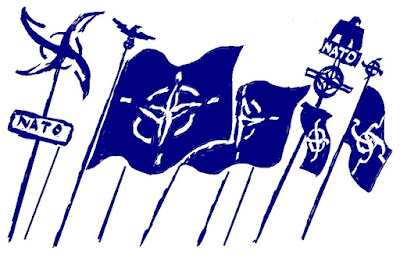Far from defending its sovereignty and independence, since February 2022, Ukraine has become an empty shell dependent on handouts from Western countries.
Ukrainian government officials receive their salaries from the US government. Under Russian strikes, the country has lost its military industry (once a key strength and source of pride for Ukraine), and is entirely dependent on pleading for US and NATO supplies now.
The war to start all wars
From the above facts, it should be clear by now that the war is not being fought to protect Ukraine's independence and sovereignty. The war is being fought to establish Ukraine's Western alignment and the positioning of Western weapons on its territory. NATO wants Ukraine. The Ukrainian government, for its part, is more and more under the spell of American neoconservatives who see no use for diplomacy in international relations and think the US should rule the world.
Sanctions have failed
Unfortunately for NATO, the biggest part of its strategy has backfired. As of now, international sanctions on Russia have failed. Vladimir Putin's government is going strong, with ample popular support for his military campaign, whereas Western regimes are faltering and unable to find a convenient exit strategy from what is becoming a new long-term foreign policy disaster following their defeat in Afghanistan.
Your sacrifices for Ukraine
It is now clear that Western efforts to help Ukraine are the source of the cost of living crisis, having resulted in higher food and petrol costs. More accurately, this cost of living crisis is directly caused by our sanctions on Russia.
Rather than create a case for removing the sanctions on Russia, ministers (and also the "opposition") are instead trying to justify the cost of living crisis and lecture the public by saying to us that we want to sacrifice our money and welfare willingly for Ukraine (some sort of mind trick?) They are then proceeding to do this for us, without offering us any choice in the matter anyway. We have two major parties in Parliament who both want to do this.
False promises
Politicians have also managed to hoodwink their constituents into thinking this connection between our failing effort to save Ukraine and the agonising cost of living crisis doesn't matter or should be tolerated because there will be ways to mitigate the cost of living crisis. However, nobody actually has a plan to make this work.
Ukraine tires
Boris Johnson recently warned of "Ukraine fatigue", something also predicted at this blog, which deliberately uses the same language used with regard to public frustration with the Covid-19 pandemic and the policies associated with it. This is an appropriate term to use, being the subject of a post already at this blog.
As established earlier, Ukraine depends on us. However, that lifeline keeping Ukraine fighting is a flimsy thread that can suddenly snap once our people here in places like Britain get bored with the repetitive messaging and flag-waving. Increasingly, there is a recognition that time is on Russia's side, producing calls either for the West to escalate aggressively or tell Ukraine to surrender territory before the outcome looks too much like a Russian victory. "Ukraine fatigue" is not just inconvenient to Ukraine, it is fatal.
Ukraine faces South Vietnam's fate
Once the war is too old and intractable for people to be interested in maintaining it in the West, Western support for Ukraine will evaporate as quickly as Western support for South Vietnam or the Ghani regime in Afghanistan did. Both of them were buoyed by similar Western delusions and propaganda claiming they were feisty independent nations, when they were actually cardboard cut-outs sponsored by the US. Any suggestion that the Russians will give up first is absurd, since Ukraine's territory is in their heartland and is their business, on an indefinite basis. The West has once again propped up a regime in a region where it does not have the will to win, and the other side does.
















